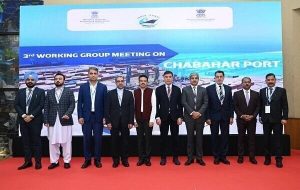Iran, India, Afghanistan, Uzbekistan discuss boosting transit via Chabahar Port
TEHRAN – Officials from Iran, India, Afghanistan, and Uzbekistan convened for the third joint working group meeting in Mumbai to explore strategies for enhancing commercial transactions and facilitating the transportation and transit of goods through Iran’s Chabahar Port. Hossein Shahdadi, Deputy Director of Port and Economic Affairs of Chabahar, represented Iran at the meeting, which


TEHRAN – Officials from Iran, India, Afghanistan, and Uzbekistan convened for the third joint working group meeting in Mumbai to explore strategies for enhancing commercial transactions and facilitating the transportation and transit of goods through Iran’s Chabahar Port.
Hossein Shahdadi, Deputy Director of Port and Economic Affairs of Chabahar, represented Iran at the meeting, which also included senior officials from India’s Ministry of Ports, Shipping, and Waterways, as well as ambassadors and diplomats from Uzbekistan, Afghanistan, and Iran.
Focus on Chabahar’s potential
The discussions centered on leveraging Chabahar’s strategic position as a vital trade and transit hub connecting Central Asia, South Asia, and the Middle East. Participants reviewed the port’s current infrastructure and operational capacity while addressing key obstacles to trade, including bureaucratic challenges, logistical inefficiencies, and infrastructure gaps.
As part of the agenda, the officials also proposed measures to streamline customs processes, enhance multimodal transport connectivity, and expand investment in Chabahar’s development to unlock its full potential as a regional trade gateway.
Chabahar’s regional role
Chabahar Port, located on Iran’s southeastern coast in the Gulf of Oman, is Iran’s only oceanic port and holds immense strategic significance. It provides a shorter and more secure trade route for landlocked countries such as Afghanistan and Uzbekistan, offering a viable alternative to traditional trade routes through Pakistan.
India, in particular, has invested heavily in Chabahar as part of its broader strategy to bypass Pakistan and enhance trade with Central Asia, Afghanistan, and beyond. The port is seen as a linchpin of India’s International North-South Transport Corridor (INSTC), a multimodal trade route linking India to Russia via Iran and Central Asia.
India’s involvement in Chabahar
India has played a significant role in the development of Chabahar Port, committing substantial financial and technical resources to its construction and expansion. Under a trilateral agreement signed in 2016 between Iran, India, and Afghanistan, India has been granted operational control of a portion of the port. Since then, the country has contributed to improving the port’s infrastructure, including the construction of new terminals, installation of modern equipment, and dredging activities to enhance its cargo-handling capacity.
In recent years, India has shipped essential commodities such as wheat to Afghanistan through Chabahar and has positioned the port as a key enabler of humanitarian assistance and economic collaboration. The development of Chabahar aligns with India’s vision of regional connectivity and underscores its commitment to promoting economic stability in Afghanistan and Central Asia.
Future goals and challenges
The third joint working group meeting also highlighted the challenges faced in realizing Chabahar’s full potential. These include the need for sustained investment in rail and road connectivity, enhancing port efficiency, and addressing geopolitical issues, including U.S. sanctions on Iran, which have hindered the pace of collaboration in some areas.
Despite these hurdles, all four nations reiterated their commitment to furthering cooperation on Chabahar and exploring innovative solutions to promote regional trade and economic integration. The port’s strategic location and growing role in fostering connectivity ensure it will remain central to the economic ambitions of the participating nations.
EF/
